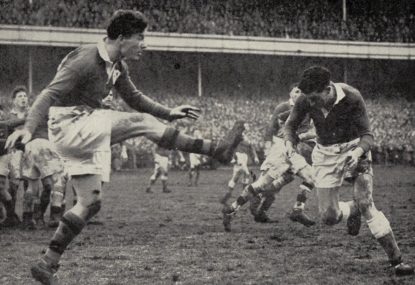Five surprises, five disappointments and five things to figure out as Super Rugby 2024 reaches the end game
After this weekend there will be five more rounds of Super Rugby Pacific and then the finals. So, let's reflect on the five biggest…

In a week in which the sporting community, in Australia in particular, is mourning the tragic, sudden and very public death of a young cricketer while competing, it may seem inapposite to mark the passing of an 88-year old man on the other side of the world.
Jack Kyle died peacefully and privately surrounded by his family after a long illness.
But when that man was one of the enduring legends of his chosen sport, whose name and feats were familiar even to those of us who weren’t born at the time of his retirement, it is worth reminding ourselves of his contribution to the game.
Jackie Kyle was the out half and most vivacious player in the first Irish rugby team to win a Grand Slam in 1948.
Of course in those days, the term Grand Slam was hardly mentioned and was secondary in importance, in the home countries at any rate, to the Triple Crown, the mythical accolade given to any of the four who could beat the other three in a single season.
Ireland and Kyle repeated the Triple Crown the following season and it would be 33 years before an Irish team managed that feat again.
Kyle was also the Test half on the Lions tour to New Zealand and Australia in 1950. Even the New Zealanders, notoriously sparing in their compliments to any players from north of the equator, were fulsome in their praise.
A retrospective published in 1978 to mark the first 75 years of New Zealand Test rugby described Kyle as “the best player seen in his position in New Zealand since the Second World War”.
For people of my generation, comfortably ensconced in middle age, he was literally the sort of legendary character one hears about at one’s father’s knee.
Over the long run, the fortunes of teams from smaller countries such as Ireland fluctuate considerably. In leaner times, one tends to take solace in the great achievements of yesteryear.
Going through team photographs in dusty old programs or year books and pointing out the great and not so great from years gone by, my dad would linger over Kyle’s photograph and wax lyrical about his ability to make a break and carve up the opposition’s defence. Of particular note, he would say, was Kyle’s astuteness.
Not every pass would result in an extravagant running attack. One could spend much of a match thinking he had a quiet game and then suddenly, the opportunity would present itself and he would be through in a flash.
My mother, dragged to games in her younger days, would offer the penetrating insight that Kyle’s shorts would often be as gleaming white at the end of the game as they were at the start, testimony in her eyes, to his genius at evading the clutches of defenders.
A modern coach might well consult his computerised statistics generated by the video analyst and conclude perhaps that Kyle’s defensive work rate was not all it might be, but as he frequently pointed out in interviews in recent years, there was no such thing as a coach in his day, certainly not in this part of the world. International teams would meet up the day before a match and such advance preparation as there was would be in the hands of the team captain.
An interview that was replayed on Irish radio the day his death was announced described the limits of tactical acumen of the time.
During the Triple Crown/Grand Slam decider of 1948, played against Wales in Belfast, the team captain Karl Mullen said to him at half time. “I think we’re a good bit fitter than the Welsh players. Move the ball wide to the wings as often as you can and tire the buggers out!”
Following his retirement from rugby in the late 1950s, Kyle took his skills as a doctor to the developing world and ended up as a country surgeon in Zambia for about 30 years.
As such, he disappeared from view to a large extent, his memory kept alive by the reminiscences of those old enough to have seen him play. But on his retirement he returned to his native Belfast, whose distinctive accent he never lost, and was a frequent sprightly and alert contributor on many television and radio commentaries until very recently.
To finish up, one might call to mind the occasion when his exploits in a match inspired a newspaper reporter to honour him in verse.
“They seek him here
They seek him there
Those Frenchies seek him everywhere
That paragon of pace and guile
The demmed elusive Jackie Kyle. “
Rest in peace, good doctor.